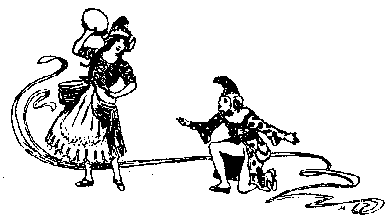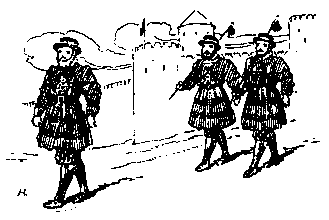Gilbert & Sullivan Opera
A History and a Comment
by H. M. Walbrook
CHAPTER XII
I HAVE A SONG TO SING, OH!

When Ruddigore finished its career the new opera was not ready, and for several months the stage was devoted to revivals of such old favourites as H.M.S. Pinafore, The Pirates of Penzance and The Mikado. When at last the time came for deciding upon the cast of The Yeomen of the Guard, or The Merryman and his Maid, a successor had to be found for W. Rutland Barrington who, after ten years' good service, had taken over the management of the St. James's Theatre, where he produced two plays, "The Dean's Daughter," and "Brantinghame Hall," which are only remembered today as having been the means of introducing to London two very impressive young actresses in Miss Olga Nethersole and Miss Julia Neilson. Mr. Barrington's season in King Street was a failure financially, and presently we shall find him back among his old friends at the Savoy.
Meanwhile, what would have been his part in The Yeomen of the Guard was allotted to Mr. W. H. Denny, an actor who had just made a bit as the obtuse and jealous village-constable in Pinero's farce, "Dandy Dick," at the Court. The newcomer at once made a great success in the character of the Head Jailor, Wilfred Shadbolt. As has been the case with many comedians, Mr. Denny's face was his fortune. Nobody on the stage could look more grim and more miserable in a comic way, and his voice could be as churchyardy as his countenance. Made up with long, forbidding black locks and an ill-shaven chin and cheeks, he was certainly as unprepossessing a lover as ever a maiden shivered before or an audience laughed at.
The Yeomen of the Guard was given for the first time on Wednesday night, October 3rd, 1888, with Sullivan conducting, and Gilbert sitting quietly watching "The Armada" at Drury Lane, but taking care to leave that theatre in time for the ovation awaiting him and the composer at the Savoy at the end of the performance. The opera is as different from the rest of the series as "A Tale of Two Cities" is different from the other novels of Charles Dickens, and for some time the audience at the premiere were a little puzzled. They found the scene laid in the Tower of London in the time of Henry VIII., and, in place of the old familiar topsy-turvydom, a straight and even rather conventional story. Underneath most of the beautiful music, too, ran a tone of sadness. Instead of the opera opening with a chorus the curtain rose on a single figure seated at a spinning-wheel and a dainty and very touching little ballad. The first entry of the Tower warders in their picturesque scarlet was made to a chorus ringing with pride and bravery, culminating in the lines:
- But our year is not so spent
- And our days are not so faded,
- But that we with one consent
- Were our loved land invaded,
- Still would face a foreign foe
- As in days of long ago,
the strain ending as a sort of trumpet call of chivalry and valour. Then came Dame Carruthers' graphic song telling the story of the Tower, and Fairfax's beautiful "Is life a boon?" both on a high plane of words and music; and then the singing farce of The Merryman and his Maid, fascinating the house, and ending amid a great roar of cheers. After that the audience settled down to the new style of Gilbert and Sullivan, and the opera proceeded from triumph to triumph.
Both collaborators had found the writing of The Yeomen of the Guard hard work. Gilbert had been five months engaged on the book, and Sullivan had found the singing farce, with its verses lengthening like those of "The House that Jack built" as the number proceeded, the stiffest problem he had ever been set. How successfully he got over its difficulties all the world knows. This morceau made the hit of the first night and is still, musically, the gem of the opera, with its diversified and elaborate orchestration, and the haunting drone that runs so pathetically through it. In the Jester's song, "I've wisdom from the east and from the west," the composer, inspired perhaps by Mozart's "Deh Vieni," gave the singer one melody and the orchestra a totally different one, played principally (as also in the Mozartian instance) on the strings pizzicato; and a similar combination is provided in Phoebe's piquant, "Were I thy bride." The musical setting for the gathering of the crowd for the Colonel's execution towards the end of the first Act is impressive and solemn, while the second Act, like that of Princess Ida, is simply a string of melodic pearls, of which the madrigal, "Strange adventure," Fairfax's ballad, "Free from his fetters grim," the delicious "When a wooer goes a wooing," and the short unaccompanied trio, "'Tis said that joy in full perfection," can be heard with delight over and over again.
With his customary care for detail, Gilbert had seen that all the "local colour" in the opera was correctly presented. The chief feature of the scene was an admirable reproduction of the frowning walls of the old Norman keep; the uniforms and accoutrements of the "Tower warders" were represented with minute fidelity, and the whole complex "atmosphere" of the grim fortress-palace and its precincts was wonderfully caught. Countless thousands all over the country have had their first glimpse of the Tower of London in The Yeomen of the Guard, and on seeing the place itself at last have exclaimed,
"How exactly like the opera!"
The question often arises: "Which is the most popular of all these operas?" When it is put to an individual in the following form: "Which of the operas is your favourite?" the usual answer is: "The one I happen to be seeing at the time." It is a fact, however, that, speaking generally, the three most popular works of the series have for some years been The Mikado, The Gondoliers, and The Yeomen of the Guard. The proof of this is the fact that when the Savoy Opera Company is on tour it has been its custom, for years past, to begin and end its visit to every town or city with one or other of these three works.
